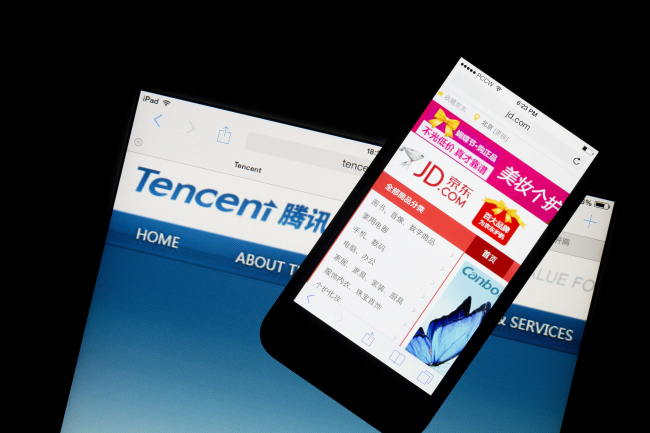Fast-growing Chinese IT firms increase clout in global market
By 박한나Published : March 19, 2014 - 13:44

Rapidly growing Chinese IT firms are aggressively expanding their presence in the global market and are posing a challenge to IT giants such as Google and Facebook.
Since its initial public offering in 2004, Tencent, a Chinese Web-portal operator, saw its market value increase more than 100-fold to $138 billion during the past 10 years.
Tencent, which also runs the mobile messenger WeChat, has been flexing its muscles in the mobile messenger market, as it has a 14 percent stake in Kakao Corp.
Kakao Corp. is the operator of Korea’s largest mobile messenger, Kakao Talk. Tencent is in a partnership with Google for promoting WeChat.

The Chinese mobile messenger is considered one of the so-called big four in the mobile messenger market along with WhatsApp in the U.S., and Line and Kakao Talk in Korea.
The Chinese mobile service has 300 million monthly active users, the second highest after WhatsApp, which has 450 million, according to a report released by BNP Paribas, an international financial services firm.
Baidu, Alibaba following in Tencent’s footsteps
The stunning growth of the Chinese Internet firm is being followed by other Chinese IT goliaths with huge amounts of capital, including Baidu, a Web-search service provider, and Alibaba Group, an e-commerce business.
“Backed by the Chinese government, which has deployed exclusive policies towards foreign firms, Chinese IT companies have grown exponentially through aggressive M&As and investment. Now the scale is being tilted towards the Chinese competitors,” an industry source said.
Alibaba purchased 60 percent of the stock shares of ChinaVision Media Group, which was worth around 860 billion won ($803 million) last Wednesday. Baidu bought 91 Wireless, China’s largest app store, for 2 trillion won.
Alibaba and Baidu are also making forays into global markets by increasingly taking over and making investments in companies around the world.
In 2013 Alibaba spent 1.1 trillion won on M&A deals, which is 10 percent of its annual revenue of 8 trillion won, and acquired online shopping firm ShopRunner for 200 billion won, according to news reports.
The e-commerce giant is poised to throw its hat in the ring by launching online shopping website 11 Main in the U.S. as early as this year.
Baidu poured 830 billion won into M&As, amounting to 15 percent of its revenue of 5.5 trillion won last year.
In April, Baidu will open a research lab called Deep Learning in Cupertino, California, aiming to develop the world’s most advanced artificial intelligence technology.
The company is also said to be working on smart glasses with voice recognition and augmented reality technology.
The rising Chinese IT companies pose a threat to Korean Internet firms such as Naver and Daum, which are currently trying to break into the global market with a wide range of mobile services such as mobile messengers and mobile launchers.
“The situation will not likely be favorable for Korean Internet firms as they are stuck between global IT behemoths including Google, and Facebook, and those rising firms including Tencent and Alibaba,” an industry source said.
By Kim Young-won (wone0102@heraldcorp.com)






![[Weekender] How DDP emerged as an icon of Seoul](http://res.heraldm.com/phpwas/restmb_idxmake.php?idx=644&simg=/content/image/2024/04/25/20240425050915_0.jpg&u=)


![[KH Explains] No more 'Michael' at Kakao Games](http://res.heraldm.com/phpwas/restmb_idxmake.php?idx=644&simg=/content/image/2024/04/28/20240428050183_0.jpg&u=20240428180321)







![[Herald Interview] Mistakes turn into blessings in street performance, director says](http://res.heraldm.com/phpwas/restmb_idxmake.php?idx=652&simg=/content/image/2024/04/28/20240428050150_0.jpg&u=20240428174656)
